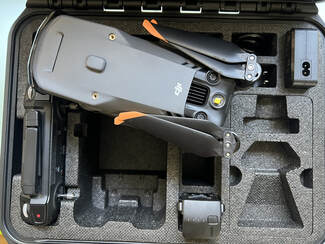 In recent years, unmanned aerial vehicles (UAVs), commonly known as drones, have gained significant popularity across various industries, including photography, videography, agriculture, and even law enforcement. However, concerns about data security and national security have led some states in the United States to distance themselves from the use of DJI drones, a prominent drone manufacturer based in China. In this blog, we will explore the reasons behind this shift and discuss the potential implications for the drone industry. The Dominance of DJI Drones: DJI, short for Da-Jiang Innovations Science and Technology Co., is a Chinese technology company that has become synonymous with consumer and commercial drones. Their drones have gained a dominant market share due to their reliability, advanced features, and competitive pricing. However, this dominance has also raised concerns about data privacy and security. Security Concerns and Allegations: One of the primary concerns surrounding DJI drones is the potential for data leakage or unauthorized access to sensitive information. There have been allegations that DJI drones may collect and transmit data to servers in China without user consent. While DJI has denied these allegations and implemented various security measures, they have failed to alleviate the concerns of some US government agencies and lawmakers. Government Warnings and Actions: The US Department of Homeland Security issued a warning in 2017 highlighting the potential security risks associated with using drones manufactured by Chinese companies, including DJI. They expressed concerns about the possibility of data exploitation and the potential for the Chinese government to access sensitive information. Ban on DJI Drones: Several states in the US have taken proactive measures to restrict or ban the use of DJI drones by government agencies and law enforcement. For instance, the Department of the Interior, which manages vast amounts of public land, grounded its fleet of DJI drones due to concerns over cybersecurity. Similarly, the US Army banned the use of DJI drones in 2017 due to potential vulnerabilities. Push for Domestic Alternatives: The concerns surrounding DJI drones have led to increased support for domestic drone manufacturers in the United States. The government has encouraged the development of American-made drones to ensure data security and protect national interests. This has resulted in a surge of interest and investment in homegrown drone companies, bolstering competition in the market. Implications for the Drone Industry: The shift away from DJI drones by some US states has had significant implications for the drone industry. It has created opportunities for other manufacturers to fill the void left by DJI, leading to increased competition and innovation. However, the absence of DJI drones also means that some government agencies and industries may face limitations in terms of drone capabilities and features. Balancing Security and Innovation: The concerns regarding DJI drones highlight the need for a delicate balance between security and innovation. While protecting sensitive data and national security is crucial, it is essential to encourage a thriving drone industry that fosters technological advancements. Striking this balance requires robust regulatory frameworks, stringent security measures, and collaborative efforts between the government and drone manufacturers. The decision by some US states to distance themselves from DJI drones due to their Chinese ownership reflects the growing concerns about data privacy, security, and national interests. While it has opened doors for domestic drone manufacturers, it has also highlighted the need for comprehensive regulations and increased cybersecurity measures. As the drone industry continues to evolve, addressing these concerns will be essential to ensure the safe and responsible use of drones while promoting innovation and economic growth.
0 Comments
|
Author(Al) Archives
March 2024
Categories |
 RSS Feed
RSS Feed